The digital universe that has penetrated the world’s existence has bestowed the consumers with the power of expressing their views publicly, thereby enforcing the companies to respond genuinely. The consumers have officially earned the highest chair in the market, thereby making themselves unavoidable for the brands to please! Thus, Goodfirms presents survey research that can be a guide to online reputation management strategy for businesses.
When the customers search about any product or service on the internet, the reviews for the same on the web autonomously frame a brand’s image for the consumers. Every component of those reviews compiled in the form of star ratings, one-liners, photos, long-form paras, etc. contributed by the users along with the responses of the brand to them, play a role on the buyers’ decisions. Well, the aim of Online Reputation Management (ORM) is to make that impact positive and encourage the prospects to convert satisfactorily.
The news, talks, reviews, rants, praises for an organization stay recorded on the internet forever. Every word forms a certain reputation and resides on the top of the minds of the employees, and clients. And as a brand, it is significant to keep those fresh experiences positive, ALWAYS. This assures progress in the right direction for any company. The benefits of this online reputation management research are that it explains the importance and positive impacts of reputation management for businesses along with suggestions from experts on how to handle negative reviews.
SURVEY OF COMPANIES AND EXPERTS FROM AROUND THE WORLD
The research team of Goodfirms surveyed 500+ firms and experts to learn how brands build, level or regulate their online reputation management strategy while experiencing both ups and downs of the reputation cycle. These fortified companies provided their maverick solutions for building and maintaining a positive image and facing the challenges while doing so. Peruse on to discover the factual report produced by the Goodfirms’ research team for the same.
Here is the full list of Research Partners, who helped us garner participants for this survey, and insights for the research.
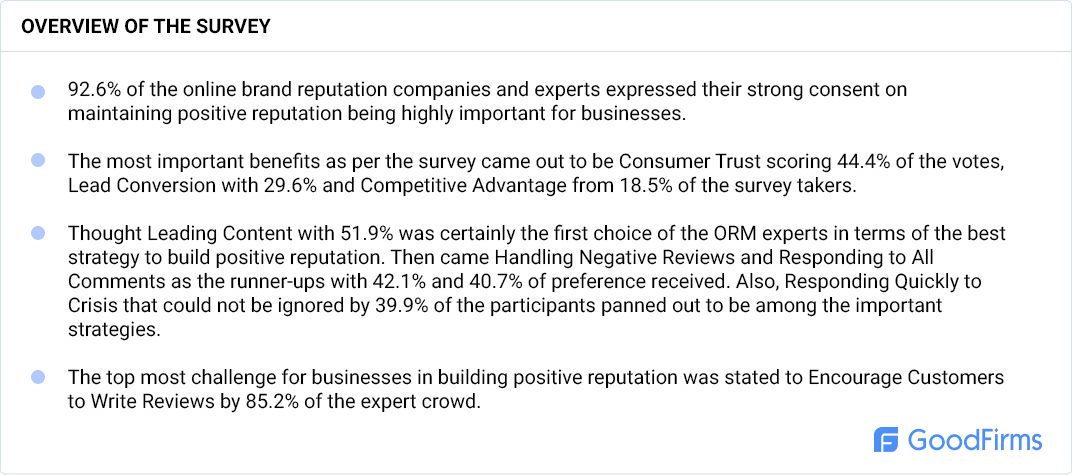
The Detailed Findings
Some savvy insights were obtained from the ORM experts in this research. These recommendations from the ORM specialists belonging to different nations have permitted Goodfirms to feature their vital viewpoints that could assist the brands in understanding the online reputation management benefits. Scrutinize the graphically represented answers of the survey questions below to get a clearer comprehension of current reputation management practices.
1. How important is the positive reputation for the success of a business?
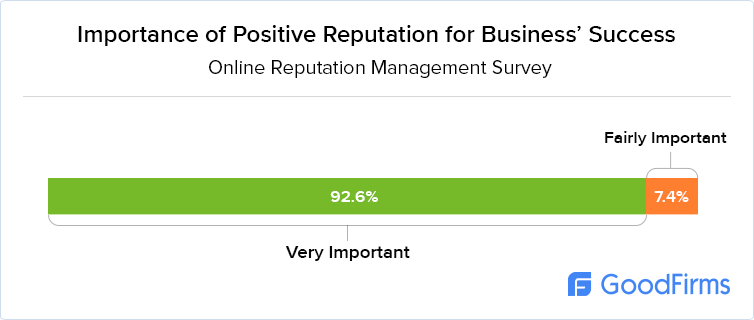
It is no surprise that 92.6% of the participants affirmed that a positive reputation is eminent for the success of any business. Making a positive reputation from the get-go is the fundamental step in being a recognizable brand that associates with clients. By concentrating on the reputation right off the bat, it can be made sure that a business not only connects with its consumers but also builds trust among the investors to grow with the right demeanour.
When two people meet for business, the conversation builds from the appearance of an organization as well. Everything matters. From the product packaging to the office location, everything should be immaculate and demonstrate to the clients and customers that you are a genuine entrepreneur who thinks highly about your organization. The online reputation management strategy ensures that you look at the part that is to be identified by your customers. Give your business the acknowledgement it deserves because when you look great, you feel better, and others will pay heed. And grabbing the attention becomes easier with a good reputation in the market. Simple as that.
2. What are the most important benefits of a positive reputation for a business?
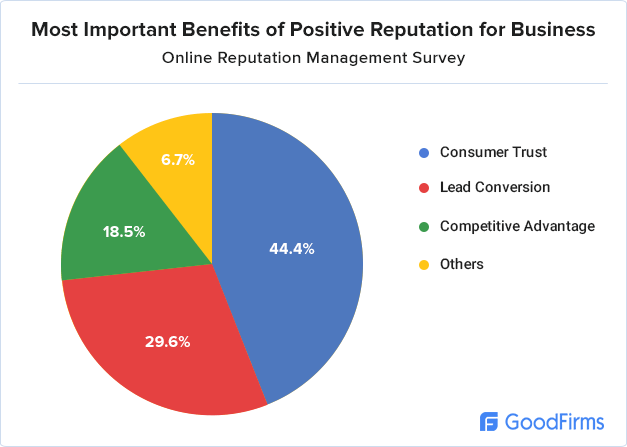
The whole point of building a positive reputation online is to create value for your business. In this survey, 44.4% of the participants chose higher consumer trust to be the top benefit of great reputation, 29.6% shared that positive reputation improves the potential of business for lead conversions, and 18.5% put their finger on the competitive advantage gained due to less risk, and more profit. Organizations with a great reputation will, in general, be dealt with better communication on the web and will always be considered for a second chance, even if they fail to deliver the first time.
Businesses with good online reputation are confided in more since individuals rely upon the sentiments of others. On the off chance that individuals seem to confide in an organization, others are probably going to pursue a similar assessment for the organization as well. The positive word-of-mouth compared to the paid promotions, better drives the trust factor among the prospects and benefits the organization in becoming profitable.
Companies with good online reviews will usually draw in more business. The generation of leads earned is more for brands with authority, which comes with a positive reputation. When a brand gains authority, people consequently tune in to what they need to state. People actually listen, taking an interest. Brands possessing authority have no compelling reason to persuade leads since consumers realize that they can confide in a brand with authority. Well, that is how reputation convert leads for businesses.
In the present competitive environment, the manner in which individuals see a brand directly affects its sales. The ascent of internet-based life and the shift from traditional promotions imply that organizations need to strongly connect with customers and focus on building a solid online reputation strategy. Reputation on the web isn't just about countering negative reviews and earning positive ones. It's also about being tied to the core values of the brand in every move. This is what gains businesses a competitive advantage by staying positive to the company's beliefs.
The other benefits of Online Reputation Management mentioned by the participants were directed towards the continuously increasing credibility, professional image, higher revenues and most importantly, the strong connection formed between the brands and their consumers.
3. What online reputation management strategies can be employed to build a positive reputation for a business?
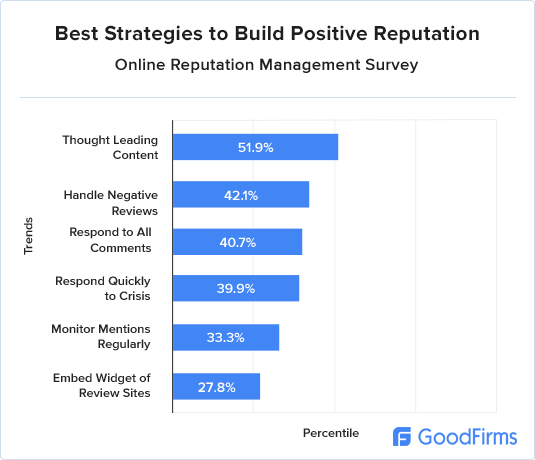
The six strategies with their percentile affirmation from the companies and experts practicing ORM have been deciphered underneath:
1. Thought Leading Content – 51.9%
The best strategy as per this survey for shaping a strong base of a business’ online reputation is thought leading content. The primary key to producing thought leading content is being updated with your industry trends efficiently and conveying it to the audience effectively. The core strategy for the creation of thought leading content lies in how to use the intel that has become the latest news for your industry and break it to the consumers, such that they get educated about the same and look up to you as a leading source of information.
The applied notion is to create a website that showcases your expertise in the respective industry domain, your market reputation through the testimonials of your top clients, your ability through the research and development of your products/services and so on. In fact, utilizing the buzz of the industry and aligning it to highlight the benefits of your offerings through use cases will ideally make your audience comfortable to trust your business. Needless to say, a positive reputation gets established for your business.
2. Handle Negative Reviews – 42.1%
The L-A-T-T-E method followed by Starbucks to smoothly convert a negative experience for the consumer into a positive one is highly effective. It reminds the employees of Starbucks to - Listen to the customer, Acknowledge them, Thank them for the feedback, Take Action, and Explain what has been done to handle the issue and improve. By utilizing an abbreviation significant to the Starbucks world, the employees get trained to implement this technique as a systematic habit. This makes sure that they know exactly what to say when a customer questions or complains about anything that goes wrong with the order.
Tackling negative reviews require spontaneity of thoughts in order to decide how to respond and what words to use for answering the disappointed consumers. The major reason is that as of today, social media channels have become the easiest point of contact for the customers. That means the customers have the power to address the business profiles publically and demand answers. And well, businesses, no matter the size, have to reply paying respect to the king of the market - the consumer.
Your sincerity in the context of your response should be evident. And the quicker you are with your response, be it typing or implementing; the better are the chances of retaining the customer. Just have a glance at the below review of Jet Blue Airlines posted on Twitter by a user for lack of services and the speedy response of the airline customer service by compensating the user for the same is what brands need to continue practicing!

3. Respond to All Comments – 40.7%
When anyone addresses your brand online, responding to comments is how you acknowledge your gratitude to users for taking out the time to peruse your content and investing their efforts to share feedback. Because if you don’t respond to the comments, it would be like giving a presentation to a group of people and not reacting to the questions and remarks from them. That definitely does not help build a positive reputation. And hence, responding to all comments regardless of them being positive or negative is requisite.
Also, with the ORM tools available in the market today, responding to all comments is barely impossible. However, focusing your customized responses only on the negative reviews do not improve the credibility of your business. You have to be creative with the happy responses as well by showing genuine gratefulness for the customer feedback. One such excellent example is demonstrated below, where the hotel manager has expressed her thoughtfulness by paying a sweet compliment to the happy customer.
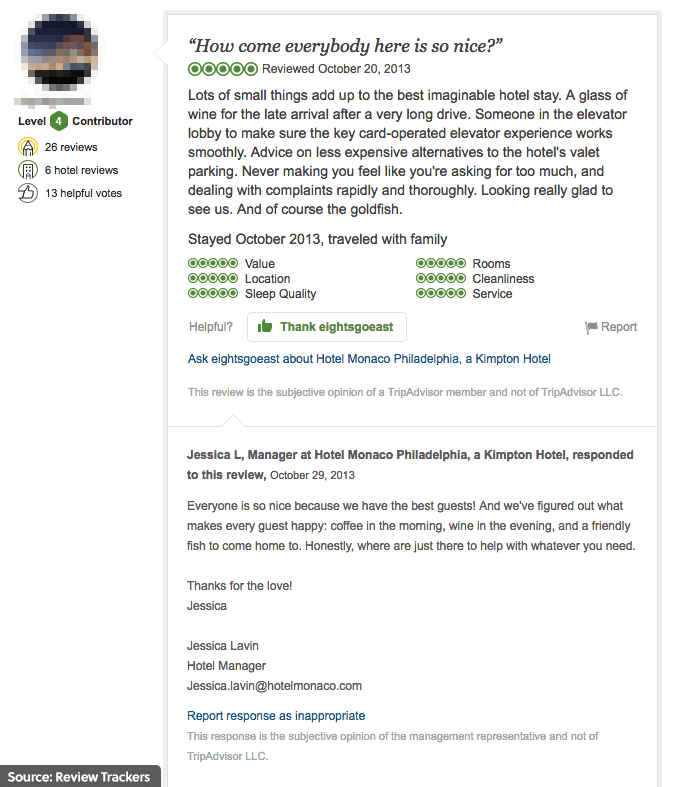
4. Respond Quickly to Crisis – 39.9%
It is important to note that a couple of criticisms do not state a crisis, though they will rapidly snowball into one if not dealt with quickly. Getting the staff trained for technologies is simple however it is a lot harder to instruct them on how to deal with online criticisms swiftly. And whilst maintaining rapidness in the process of responding to a crisis, ensure that you have taken a gander at all the information and revert accordingly. It is important to put yourself in the shoes of the consumer, assess the comment and deliver a logical response instantly without involving emotions. That way you will be able to see the flaw appropriately through the consumer’s perspective and suggest a solution.
5. Monitor Mentions Regularly – 33.3%
Monitoring the online mentions of your brand can help build a better association with your clients. If you look online for spaces where your brand is discussed consistently, interacting with the talkers can help assemble connections. Learning from the customer insights and tackling all the issues that they have will portray your brand as an ethical business in the market.
Not just that, listening to people who have purchased your products or services can help you update your marketing strategies with better brand messages. Moreover, mentions of your brand on any trusted go-to website bring in new leads frequently. This even helps brands build a better social network and grow new communities online.
6. Embed Widget of Review Sites – 27.8%
Third-party validations from reputed review platforms like Goodfirms add value to the brands. These review sites hold in a treasure of authentic reviews posted by clients with detailed experiences listed in a single web page. And embedding widgets on the homepage of your website with direct link to your profile on these review sites can greatly enhance the reputation of your company giving your clients and customers one more reason to trust.
4. Which is the top-most challenge faced in the process of building a positive reputation for a business?
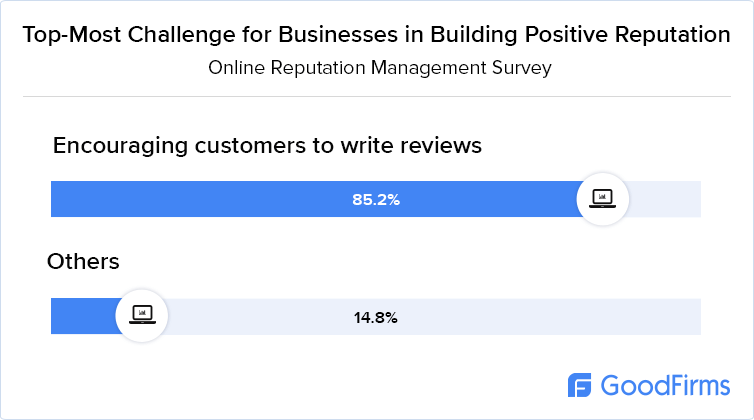
Marketing based on perceptions is the new phenomena being adopted by the brands to paint a positive image of their products/services. The validations and opinions, autonomously craft a particular image for a brand. Simply put, positive reviews matter a lot. And hence to no one's surprise, a lion’s share accounting 85.2% of the ORM experts’ crowd chose encouraging customers to write reviews as the top-most challenge for building an online reputation strategy.
Apparently, thinking that no one important reads the online reviews would be unwise. The readers are in millions. And the purchasing decisions of these readers depend on the reviews and not simply on the advertisements or promotions. The additional challenge adjoining the aforementioned one is to separate the genuine reviews from the fatuous ones. Businesses seek unbiased feedback describing the shortcomings and strengths of products/services, and convincing the consumers to write them is one effort-taking challenge. This could only be achieved by making a strong impact on the customers’ minds by showering them with unparalleled and if possible creative experiences.
The other challenges that were gathered by the research team of Goodfirms from the experiences of ORM experts turned out to be constant monitoring of the review platforms, maintaining high promptness for replying to the reviews, reminding the clients without frustrating them to write the reviews and so on.
5. How to handle negative reviews?
This is the inevitable situation faced by businesses. Every customer has its own demand and fulfilling every distinctive wish can sometimes become a hectic mess. This results in negative reviews for businesses. The shoutouts aren’t always positive and brands should always be able to pan out its way out of any crisis.
This survey-based research helped the Goodfirms team to dig out interesting ways from the varying experiences of international ORM experts. Some of their online reputation management strategies are stated below:
-
Online reviews come with the territory. What’s unfortunate is that no matter how well a business is handled, some of the reviews are going to be negative. And there’s nothing that can be done to ignore it. But the reaction towards them is in complete control of businesses, and they should be handled carefully. All that can be done is putting in constant effort to provide top-notch customer service at every opportunity. This will gain genuine customers and prospects who will appreciate those efforts.
-
There is always a reason for a negative review, either it can be the bad service experienced by the client or poor customer support. Find out the reason behind it and improve that aspect. Then, contact your client/customer who is dissatisfied and let know that it was completely unintentional and you have got a solution for it.
-
With regards to communicating, never lash out. Keep it affable and proficient, similarly as you would up close and personal. Additionally, just address valid concerns. Try not to let online trolls draw you into a session of one-upmanship. Be straight to the point and rule out any sort of distortion in your interpretation.
-
Thank reviewers for setting aside the opportunity to draw their terrible encounters out into the open. Tell them you pride yourself on exceptional customer service and value the chance to make things right. Tell them you're tuning in and truly concerned. A little yet genuine sympathy goes far.
-
Sometimes, wait a little while, and see if your friendly customers jump to your defense. Their independent rebuttal will be much valuable than your own. On the off chance that no one steps forward, maybe you could even urge an agreeable client to answer for your benefit.
-
Negative reviews come out of certain kinds of dissatisfaction and lack of motivation but these can actually encourage business to discontinue certain prevalent practices or to take care of whims and wishes of its prospective clients. So, handle them by being honest and sharing your side of the story.
CONCLUSION
The above online reputation management strategies for business must have proved it to you that a positive reputation of a business is paramount. As per the top branding agencies, companies should always listen to what their customers are stating about their business and take the required measures to secure their reputation decently. Also, keeping a good hold of the platforms that are under the company’s control like websites and apps can be highly beneficial. The platforms that are not under complete control of businesses like social networks, groups, and forums should be dealt with by being active, approachable, diplomatic, and careful. Reputation strongly affects the bottom line.
Let us know your views about the research. Also, do comment on your views or points that you think can be added to the above research study.








